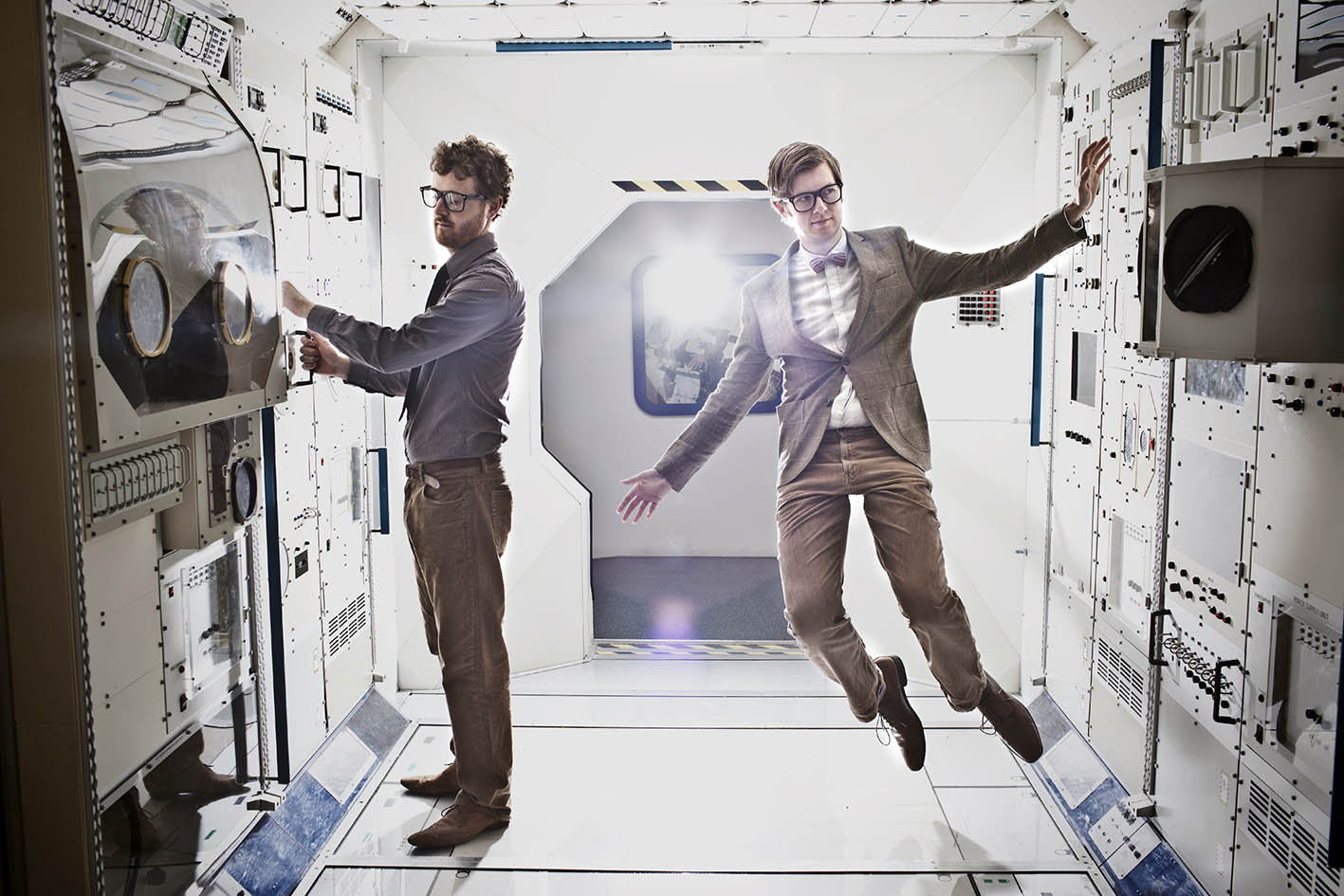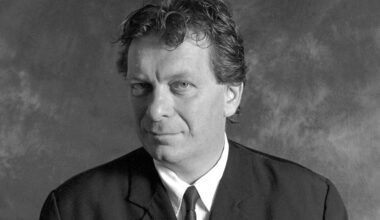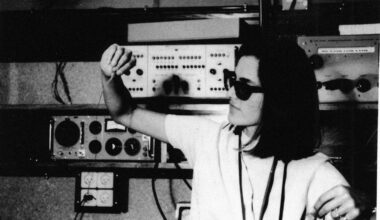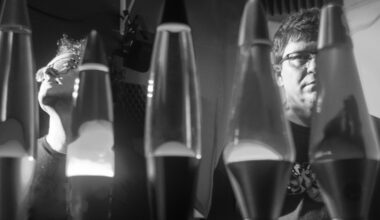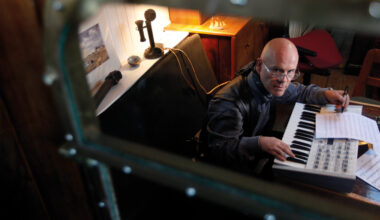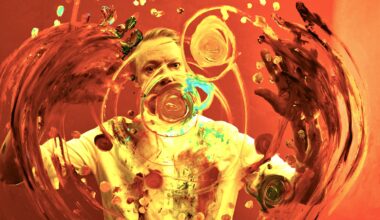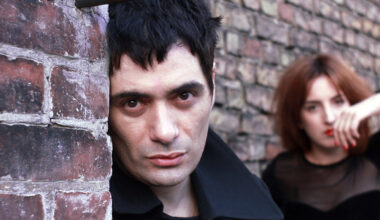Public Service Broadcasting are one of the most exciting and unusual bands in the electronic music universe. On the eve of the release of their stellar second album, ‘The Race For Space’, PSB main man J Willgoose Esq explains his fascination for inspirational samples, cascading melodies, thumping beats and sending rockets to the moon
Public Service Broadcasting are a peculiar phenomenon and a peculiarly English one at that. Are they a band? Are they an art project? PSB certainly have Arts Council funding – and that in itself is an indication of the changing face of the music industry. It’s heartening to know that the Arts Council will consider putting lottery dollars into a couple of guys who have set about creating an electronic music project initially based on sampling the nation’s film archive of the Second World War.
“The Guardian said we’re more a concept than a band,” says J Willgoose Esq, Public Service Broadcasting’s corduroy-and-bow-tie-wearing main man, over a pot of tea for two at what is possibly the only pub in south London owned by the National Trust. “I see where they’re coming from, and I don’t think they meant it in a derogatory way, but people have since thrown it at us as an accusation. I kind of disagree. People don’t go to gigs to see concepts, they go to see bands. And if we weren’t a band back then, we are now.”
Whatever PSB might be, J Willgoose Esq and his partner Wrigglesworth are popular. The pair have built up a considerable following over the last couple of years with a mix of electronics and live instrumentation in the shape of guitars, drums and even a banjo, packaged up and fronted by a kind of languid Oxbridge BBC presenter, circa 1950. And all of this without a record company flexing a marketing muscle.
“That’s not something a lot of people have picked up on,” notes Willgoose. “I can’t think of any other group playing at the Roundhouse who’ve got there without a label behind them. Maybe things are changing. We were lucky to get a bit of funding from the Arts Council, though, which definitely paid for some of the more expensive things on our new album.”
‘The Race For Space’, Public Service Broadcasting’s second album, is replete with expensive things. Thirty five singers and musicians, including dream pop duo Smoke Fairies, cello and viola players, and a sizeable choir, have helped to create what is a musical tribute to the 15 years between the launch of Sputnik in 1958 and the end of the Apollo programme in 1972, 15 years of the USA and Russia duking it out for supremacy in space.
It seems like an obvious step for a band whose music so far has taken its inspiration from the exploits of the Second World War and the conquest of Everest. Their breakthrough record was the stirring ‘Spitfire’ single. Ironically pressing into service a decidedly krautrock sensibility in order to celebrate that most British of wartime iconography, it’s the song that sends the crowds crazy when PSB play live, with its nagging guitar hook and cascading melodies. J Willgoose Esq and Wrigglesworth perform it with archive footage of the fighter planes twirling through the sky behind them, giving an impression of flat-out admiration for the heroes of the 20th century.
“It’s not something I’d have said was that big a deal for me before Public Service Broadcasting,” says Willgoose. “It’s really weird what making music teaches you about yourself. You get asked in interviews why you did things a certain way and you have to think of proper academic reasons. What’s pleased me most about what we do is that there is a positivity to it, even in the darker times, and anybody who knows me well would definitely not say I was a positive person. I’m one of the most pessimistic, self-doubting, self-deprecating people you could possibly meet, so I find it really weird that our music comes out with this feeling of belief in the world to come, a feeling that everything’s going to be alright.”
Maybe pessimists are just thwarted optimists?
“Maybe I’ve found a way for my optimism to come out. Then again, my view of the album is shrouded in doubt and negativity.”
With ‘The Race For Space’, PSB certainly haven’t plumped for the easy option. They haven’t re-written ‘Spitfire’ 10 different ways and released a collection of crowd-pleasing big tunes. While there is at least one such track on the album, the purposeful ‘Go’, which is about the Apollo 11 moon landing, ‘The Race For Space’ as a whole demands a little more of its listeners. It’s perhaps worth noting the response to the first single from the album, the horn-driven ‘Gagarin’, named after Yuri Garagrin, the first man in space. It seems that not everyone wants their favourite tweedy electronic geeks going all funk on them.
But ‘The Race For Space’ is a more nuanced and carefully constructed work than ‘Gagarin’ and its brassy swagger suggests. It takes several of the significant moments and achievements of the space race era as leaping off points for creating new pieces of music that combine an earnest sense of admiration for their subject matter with what is now a recognisable PSB musical landscape, albeit matured.
The album is almost teasingly slow off the mark. The opening title track samples JFK’s 1961 speech, in which he sets out his plans for America’s space programme, with a backing track of a heavenly choir. ‘Sputnik’ is a seven-minute orbit of mostly subtle metronomic pulses and bleeps and blurts before building into a crescendo that is actually never quite resolved. And then ‘Gagarin’ kicks in. It’s quite a jolt to the system. A superfly funk blast.
“It came out that way,” says Willgoose. “Going back to the first album, we did fairly well with the critics, but there were some who couldn’t get their heads around us using samples and writing new music around them. They said things like [adopts enraged critic voice], ‘The samples have nothing to do with the music! It makes no sense! Agh!’. It seemed to really annoy them. With this record, I wanted to continue the non-literal relationship between the music and the samples, rather than go down a sci-fi, 60s-sounding, original Radiophonic Workshop route, which I think is what some people might have expected.
“Looking at the footage from the time and listening to some of the quotes, Yuri Gagarin seemed a larger-than-life figure, even though he was only about five-foot-two. He was the most famous man in the world. He was on the front of every newspaper everywhere. He blazed a trail to the stars and he was the ultimate hero, the symbol of mankind’s triumph over nature. It struck me that the song should try to capture some of his exuberance and energy and somehow translate that into music. I like the way it’s not quite what you’d expect. It’s not for nothing that the horn blast is so in-your-face. It’s supposed to be a bit of a statement, it’s saying that we’re not going to just do the same old same old. There’s more to us than that.”
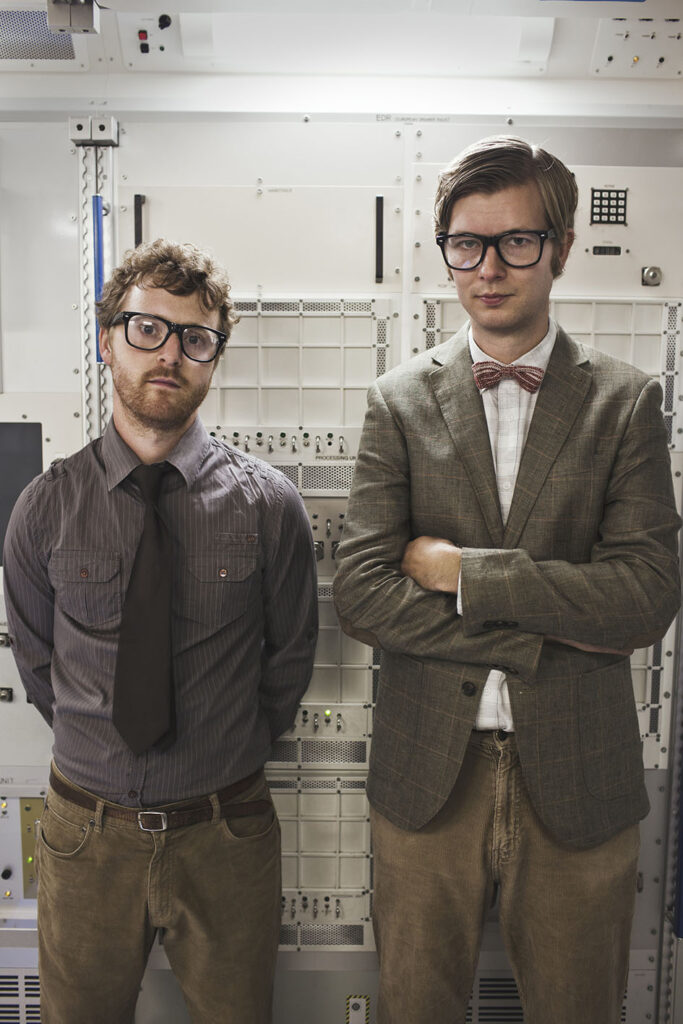
A few weeks before this interview took place, Virgin Galactic’s SpaceShipTwo crashed in the Mojave Desert, with the loss of one pilot. The Apollo programme had its own tragedy in 1967, with a fire on a test launch for Apollo 1 which killed the three astronauts on board. Journeying into space is a dangerous pursuit and Mr Willgoose felt he had to acknowledge that. The result is a track called ‘Fire In The Cockpit’.
“I had massive doubts about us trying to deal with that,” he admits. “But every astronaut account I’ve read and some of the other books I’ve read all seem to suggest that, terrible as those deaths were, they saved more lives than they cost. They probably saved the lives of nine to 12 astronauts. So it was a big event in terms of the implications it had for the whole Apollo project, including Apollo 8 going to the moon earlier than it was supposed to have done and the gamble they took on doing that, and it seemed it would have been more disrespectful to leave it out.”
The elegiac cello lines of ‘Fire In The Cockpit’ emerge from a white noise of radio signals and dark electronic tones, providing a suitably sombre backdrop for the sampled voice announcing the Apollo 1 accident.
“There’s no way you could take a different approach,” says Willgoose. “But I didn’t want it to be too maudlin, too melodramatic. I remember when we were recording the cellos, one of viola players who’d just played on ‘Gagarin’ leaned over to me and said, ‘Don’t you want to add to some vibrato?’, but I didn’t want it to be pushed too far. I wanted it to be a straight and terrifying treatment of what was an awful event.”
Overall, ‘The Race For Space’ is an understated album. It bypasses the obvious neon sci-fi approach for a more reflective take on the subject. Even the mastering of the record itself is restrained.
“It’s not ludicrously loud, not a square wave assaulting you for 45 minutes,” explains Willgoose. “That just tires your ears and I didn’t want it to be like that. You want there to be a reason to come back to the album. I was thinking about Radiohead’s ‘Kid A’, in the texture of it as much as anything else, and I was trying to get somewhere towards that.”
He remains nervous about the album’s reception, though.
“I’d be quite upset if the people we’ve brought with us to this point suddenly went, ‘This is terrible, you’re idiots’, and walked away. Deep down, I don’t believe they will. I think the album is quite good, even if it is possibly not what people expect. But that’s deliberate. It’s designed to surprise and challenge in a couple of areas, it’s not designed to be safe.”
Willgoose and Wrigglesworth haven’t yet revealed what they’re planning for their live show when they tour ‘The Race For Space’ (“We’re keeping it under our hats, although it will be space specific”), but the astronaut suits they wear for the ‘Gagarin’ video cost £2,000, so if they’re not employed in some way then they’re not getting their money’s worth. And the campy theatricality at the heart of the Public Service Broadcasting aesthetic – the pseudonyms, the bow tie and specs, the general air of the Enigma code breaker – certainly lends itself to dressing up.
Thinking about it, it’s all rather prog rock, isn’t it? In a knowing, de-contextualised (so without the long hair, Roger Dean artwork and horrible solos) and 21st century way, that is.
“I’m not a fan of 70s prog,” declares Willgoose. “Not even early Genesis, which might be widely accepted, I suppose. Definitely nothing with flutes on. Concept albums always used to terrify me a bit, and we’ve ended up making at least one, probably two. It’s a very strange situation to find yourself in.
“In terms of the live show, it’s based on bands that I’ve seen who have put something different into their sets, rather than the ones where the gig sounds exactly the same as the album and the presentation’s boring and it feels like you’re supposed to be grateful for even being in the same room as them. It’s not a reason to go and spend £30. A lot of it comes from a formative experience watching The Flaming Lips. That’s more the performance side of things and it’s a way of compensating for the fact that we’re not very charismatic people on stage, we’re not jumping around like Biffy Clyro. It’s about wanting to put on a good show, wanting to entertain people, and turning your weaknesses into strengths.”
‘The Race For Space’ is released on Test Card Recordings
